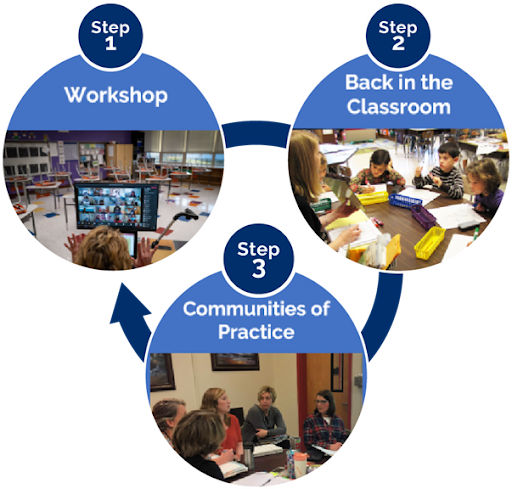Bianca Dino, Manager of Professional Learning at Learning Ally
One of our West Coast district partners—and also one of the largest school districts in the country—experienced significant challenges before discovering the transformative power of actionable learning.
Despite investing in a popular professional learning program to improve literacy instruction, administrators saw no meaningful changes in their teachers’ classrooms.
Educators understood the concepts but struggled to implement them effectively. In addition, high turnover left many new teachers untrained. Ultimately, the professional development was viewed as a waste of time, and administrators were frustrated by the lack of positive outcomes.
Breaking the Cycle
This situation reflects a widespread problem in education. Incomplete professional learning experiences often result in inconsistent practices and confusion. Multiple-year, intensive programs may be comprehensive, but the sustained cognitive load can cause burnout before yielding results. Limited resources and high costs mean not all teachers receive training, creating disjointed efforts and slowing instructional progress. Over time, this can create professional learning challenges.
The consequences of this cycle are significant:
- Educators become resistant to new learning opportunities
- New teachers feel overwhelmed by curriculum demands and professional development
- Students lose opportunities for improved instruction
A New Approach: Structured Literacy in Action
As former educators who understand these challenges, our professional learning team created Structured Literacy in Action with one key goal: ease of implementation. The program goes beyond covering the “what” and “why” of evidence-based literacy instruction; it provides real-world examples of the “how”.
Educators cannot be expected to translate new ideas into practice immediately. People naturally gravitate toward familiar methods, especially when feeling overwhelmed. To shift this mindset, we must offer examples that inspire confidence, excitement, and motivation, while also creating a safe space for educators to take risks with new strategies. Research shows that students benefit from explicit, systematic, and sequential instruction with opportunities for guided practice, repetition, and real-time feedback. Likewise, adult learners need engaging, evidence-based learning experiences designed to provide the support and follow-through required for meaningful results.
Our program provides robust, science-based reading approaches, systematically breaking down strategies for implementation in Tier 1 classroom settings. It is a solution that unifies knowledge for all educators and promotes timely collective action to elevate their literacy instruction without trading rigor for reward.A recent participant reported, “I was planning to retire early and leave teaching, but something clicked for me. I get it now, and I feel excited to teach again. I can’t wait to bring this to my students.” This type of feedback reflects the heart of Structured Literacy in Action. Teachers empowered with practical, actionable professional development are more likely to stay in the profession longer, with greater satisfaction, which is a winning combination for teachers, students, and administrators.

3 Steps to Effective Literacy Professional Learning:
- Authentic Demonstrations: In partnership with the Dollar General Literacy Foundation, Learning Ally filmed real educators implementing structured literacy routines. These videos serve as a collaborative “literacy lab,” allowing participants to observe and reflect on practical implementation.
- Actionable Strategies for the Classroom: Each session concludes with a concrete step for immediate classroom application, bridging the gap between theory and practice.
- Communities of Practice: Follow-up sessions encourage reflection, collaboration, and skill refinement. These foster trust, encourage growth, and empower teachers to experiment without fear.
The Proven Impact of Effective Teacher Training
The program’s effect on educators has been profound. As one teacher shared, “This was an amazing session. I am walking away with many tangible and doable strategies for tomorrow!” By reimagining professional learning, Structured Literacy in Action transforms educator experiences from burdensome to rejuvenating. In fact, this district’s educators gave our training a 98% satisfaction rating. It provides:
- Engaging, evidence-based learning experiences
- Support and follow-through for meaningful results
- A unified approach for all educators to uplevel literacy instruction
Reimagining Professional Learning for Results
Professional learning should never feel like something that happens to educators; it should feel like something that happens for and with them. Structured Literacy in Action achieves this by providing clear, actionable steps and fostering supportive communities of practice. The result is a transformative experience that reignites educators’ passion for teaching—turning knowledge into action—and ultimately benefitting struggling readers through improved literacy instruction.
About the Author

Bianca Dino is dedicated to creating and implementing results-driven solutions that elevate the quality of literacy instruction across diverse programs to inspire transformative changes in teacher practices. Her primary focus is to empower educators and organizations to foster an inclusive, student-centered culture and establish robust infrastructures that guarantee positive change.
FAQs
How does professional development impact teacher retention and job satisfaction in literacy education?
Effective professional development is crucial for retaining literacy teachers and enhancing job satisfaction. When teachers participate in meaningful, practical professional learning, they report higher job satisfaction and are less likely to leave the profession. Structured literacy PD strengthens their skills, boosts their confidence, and builds meaningful connections among educators, addressing the root causes of turnover.
What role does professional development play in maintaining the effectiveness of long-term literacy teachers?
Professional development is essential for both new and veteran literacy teachers. It ensures that teachers continue to develop the skills they need to adapt to new challenges and to implement high-quality and differentiated literacy instruction. Continuous learning opportunities help long-term teachers refine their practices, stay updated with the latest instructional materials, and maintain a growth mindset, which is critical for sustaining effective teaching over the long term.
How does professional development in literacy education contribute to a thriving school environment and improved student outcomes?
Professional development in literacy education is vital for creating a thriving school environment and improving student outcomes. The most effective literacy leadership teams arrange for professional learning that supports teachers in understanding and implementing high-quality literacy instruction. This enhances teacher practices and promotes a supportive school community where teachers feel valued and motivated. As a result, student achievement improves, and educational equality is enhanced, as teachers are better equipped to meet the diverse needs of their students.
How does professional development in structured literacy and the science of reading help teachers support struggling readers?
Professional development focused on structured literacy and science-based reading is instrumental in equipping teachers with the tools and knowledge to effectively support struggling readers, and students with dyslexia. This approach, rooted in decades of research, emphasizes explicit, systematic, and cumulative instruction in phonological awareness, phonics, fluency, vocabulary, and comprehension. By participating in such professional learning, teachers can develop the skills to identify and address reading gaps, provide targeted instruction, and create a structured learning environment that builds skills incrementally. This ensures that struggling readers receive the precise support they need to catch up and achieve reading proficiency.
How can teacher training and professional development ensure that literacy instruction remains aligned with the needs of struggling readers, even as their reading levels improve?
Teacher training and professional development are crucial for maintaining alignment between literacy instruction and the evolving needs of struggling readers. As students progress in their reading abilities, teachers need continuous learning opportunities to refine their instructional practices. Professional development programs provide teachers with the latest research-based methods and resources. Teachers can learn about relevant technologies, such as audiobooks, and how to integrate them into their teaching to support students at various reading levels. This ensures that instruction remains dynamic and responsive to the changing needs of students, fostering continuous reading growth and development.